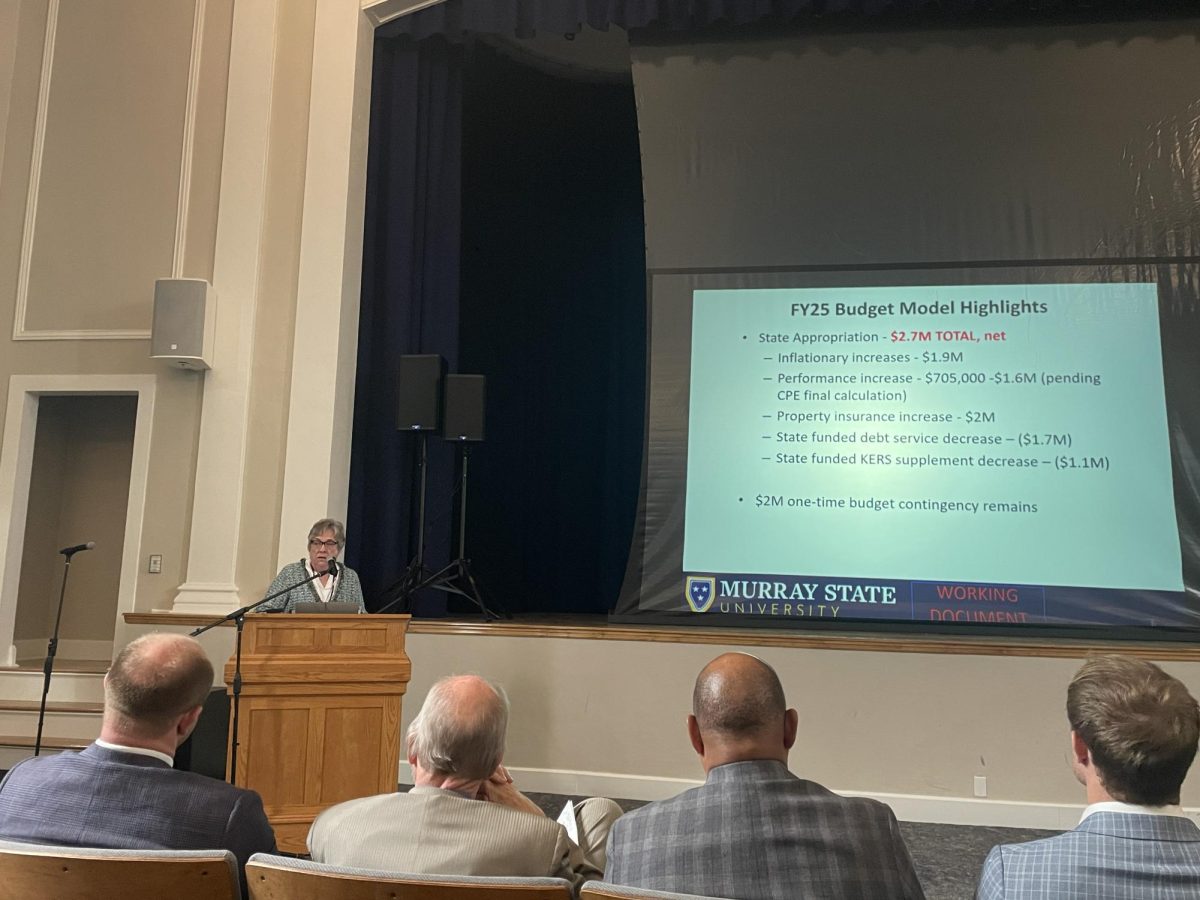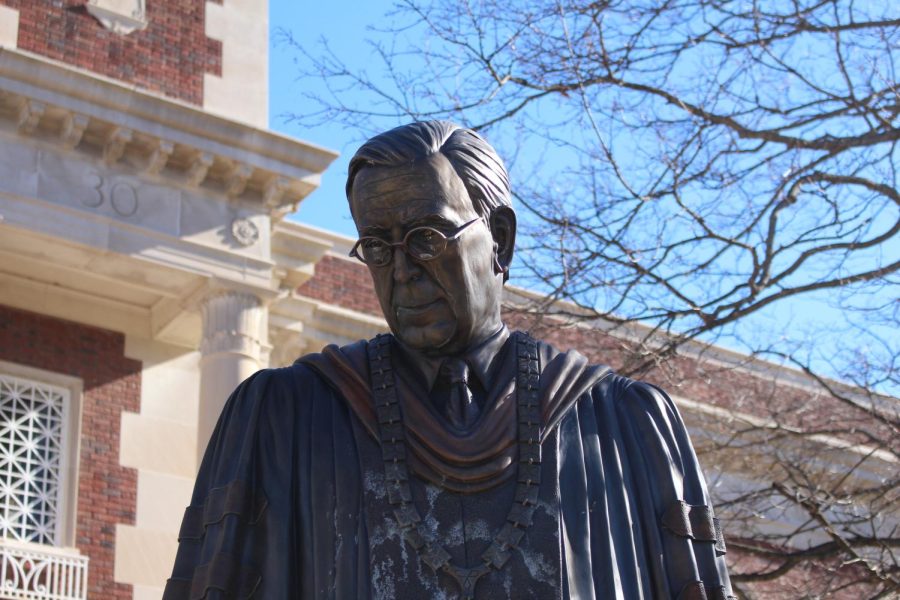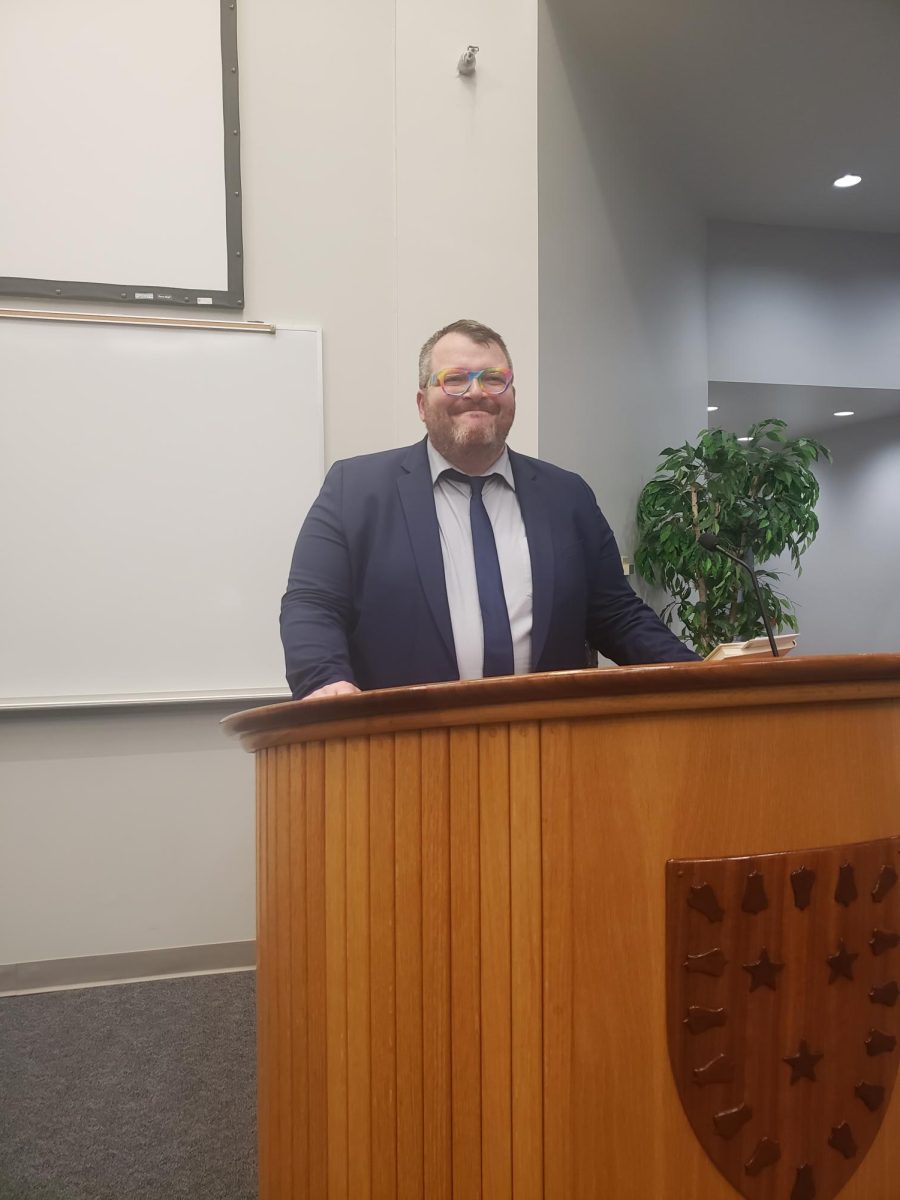One occasionally comes across a deposit of such misunderstanding and bad logic, coupled with sweeping hauteur and spin-doctoring, that it merits not a “token response,” but an outright decrying. Such is the case with Mr. Colton Givens’ and Steve Herr’s recent columns.
Givens would like to imagine that he could just sweep Dr. Zingrone’s arguments under the rug for their supposed belittlement and incomprehensibleness. But notice that Givens never attempts to demonstrate the nature of his own claims. With what reason(s) are these arguments worthy of such claims? Maybe it is Mr. Givens’ inability to comprehend them that is the problem as opposed to their claimed incomprehensibility.
Mr. Givens comments on the question, should “only those views which are scientifically verifiable, the only views which he believes are legitimate,” be allowed in the spectrum of modern discourse? Well, quite frankly, yes! There are good reasons why we have abandoned and will no longer consider unscientific views. For instance, there are good reasons why we no longer consider faith healing a valid medical practice for our hospitals – precisely because it does not work. We no longer perform human sacrifice as a method of agriculture to acquire rain and a good crop. Modern science has left creationism in the dustbin of mythology because it is a blatant lie. So, unless Mr. Givens wishes to return to the Dark Ages or worse, it is precisely scientific views that matter in this world.
This is what it is to have a modern technological society. And it should be pointed out that scientific views are not believed as Mr. Givens claims. They are accepted. When the facts and data support the hypothesis, it is no longer a question of belief, but of acceptance.
However, the most glaring example of bad logic rests in Mr. Givens’ assessment of Jefferson’s “wall of separation between Church and State.” Mr. Givens claims that this is not a call for a secular government, but that “the government cannot favor any one belief system over another,” (supposedly including secularism).
Oh, really? Well, what about that very system of belief? That is, that system of belief that states that the government cannot favor one belief system over another?
If the government favors that system, then Mr. Givens’ argument has contradicted itself over the very thing that it set out to argue against! With this view, not even the beliefs embedded in the system of democracy can be favored!
Mr. Givens’ view would lead to the government not being able to favor the very view with which it established its foundation on. Myriads of other contradictions follow from this phantasmagoria that Mr. Givens has constructed and we can thus dismiss it simply as a failure. Mr. Givens might argue that this is not the same sort of belief system as he spoke of, or that he meant only religious beliefs. But notice that he continues on to speak of the “beliefs of … atheists.” But just what beliefs do atheists hold?
Certainly not religious ones, since atheism is the lack of belief in theistic ideas. So, this is not an escape from the contradictions. The problem rests in Mr. Givens’ definition of secular.
According to the Oxford English Dictionary, secular denotes “attitudes, activities or other things that have no religious or spiritual basis.” A secular government is not one that is anti-religious, but one that is neutral on matters of religion.
This is why religious claims are not welcome from Rep. Braun or anyone in political power, precisely because the government cannot use religious ideas to run this nation. We can therefore conclude that Mr. Givens’ idea that the government is not secular is nothing more than a shallow, pseudo-intellectual, spin-doctored sham.
As for Dr. Herr’s seeming affinity for chuckling, if he wishes for secularists to be strictly scientific in every last facet of their lives, perhaps then instead of spitting out his juvenile, high-handed egotism, he can challenge secularist’s views at one of many secular meetings held on campus each year.
Or, perhaps instead of the conversation not being scientific enough, it would be too scientific for him to handle.
Commentary by Benjamin Shelby, post-baccalaureate from Boaz, Ky.

































































































Melissa Engleman • Nov 22, 2012 at 4:56 am
Wonderful article. And well thought out, as usual, Ben Shelby.
Ben Shelby • Nov 22, 2012 at 4:59 am
Thanks, Melissa! 🙂
Colton Givens • Nov 10, 2012 at 5:11 pm
The First Amendment requires that all opinions, not just scientifically verifiable ones, be allowed in public discourse. Of course, in the marketplace of ideas all opinions are subject to criticism, but to disallow all opinions based on faith is not allowable in America.
In addition, the Supreme Court has continually ruled that a government can have religious components while still retaining an overall secular nature. Examples would be a chaplain's prayer to open a legislative session, the display of a creche at Christmastime, and the inclusion of the Ten Commandments in courthouse displays. Each of these have a religious nature, but do not amount to an official establishment of religion.
Ben Shelby • Nov 21, 2012 at 12:04 am
So, it seems Facebook did not notify me that others had commented here and thus, my apologies for not responding sooner.
Colton,
As for your first paragraph, I completely agree! You seem to have mistaken what it was I was addressing. I said nothing about what the First Amendment of the Constitution actually says or what is current law. I simply commented on what SHOULD BE the case. Of course I know what the First Amendment says. As for Rep. Broun, which was a topic in my, your and Dr. Zingrone's articles, his comments about creationism should be laughed off of the floor and not considered as anything but childish fantasy. So, by my saying that "it is precisely scientific views that matter in this world," I mean to say that it is scientific views that will move us forward in an ever-growing community of knowledge-based learning.
Now, before I get accused of not being in favor of free speech, let me make something clear. I am very much in favor of free speech. What I am not in favor of is policy being made based off of unscientific claims and ideas. By all means let the creationists speak their mind. But it should never be the case that we allow creationism to be taught as science in our public schools. This is an important difference that people often confuse and it needed to be made clear.
As for your second paragraph, it seems you have come to your senses and agreed with me that the nation is, in fact, secular! That is, unless you meant something different with your statement, "In addition, the Supreme Court has continually ruled that a government can have religious components while still retaining an overall secular nature." So, by your own admission, it seems that even if the Supreme Court rules that the government can have religious components, it continues to be secular! Given that, I don't see why you even mentioned the religious component thing in the first place. But since you did (and since I can't let you off that easily), let's examine your claim about religious components.
Please don't take me for ignorant (despite what you may wish to be the case) over concerns of the Supreme Court and things like the Ten Commandments. The Supreme Court has more than once ignored requests to hear cases on Ten Commandment bans (O'Bannon v. Indiana Civil Liberties Union, No. 01-966; Ohio Judge James Deweese of Richard County's appeal to the SC; and others) and even ruled that the display of the Ten Commandments in two Kentucky court houses (McCreary County v. ACLU of Kentucky) was unconstitutional! I could continue on and list more Supreme Court rulings (not to mention the plethora of other lower court rulings against the Ten Commandments) but let's look at one final case that I'm sure you will probably cite should I not address it and that is the Supreme Court ruling over the Ten Commandments on Texas statehouse grounds that actually allowed the Ten Commandments to continue being displayed. While the majority vote was that of "no opinion," the deciding vote in favor of the displaying of the Ten Commandments was made by Justice Breyer. But notice his carefully decided ruling. Justice Breyer acknowledged the religious message of the Ten Commandments but concluded that message was offset in Texas by the fact that the monument has stood on the statehouse grounds for 40 years. This is important, for what is shows is that the ruling was made not in favor of religion, but of a tradition. This is vitally important (though I wish the ruling had been that the Commandments be removed) because what it shows is that the Supreme Court did not rule in favor of a RELIGIOUS component, but for a TRADITION component. Thus, the high court did not rule in favor of something BECAUSE OF RELIGION (caps is my equivalent of italics for emphasis here since italics don't exist on FB). So, that seems to strike down your claim about the court ruling in favor of religious components. Also, we could go into why ruling in favor of tradition purely for tradition only is a logical fallacy, but that need not take up space here. Now, while I have not addressed the prayer issue or the creche at Christmastime issue, it seems as though I have done a fair amount of work to show that you at least need to review your Supreme Court rulings.
In sum, we can break down your reply into three sections:
1. You mistook one of my views for something else.
2. You conceded my point about the government in fact being secular.
3. Given 2, you provide us with (relative to this discussion) meaningless examples of instances that, even if true, would still result in a secular nation by your own admission.
The last question, I guess, is did I just waste a lot of time replying to you when I could have made the same exact point by simply saying, "Colton, thanks for agreeing with my opinion article!"?
Colton Givens • Nov 21, 2012 at 12:31 am
I am perfectly aware of your views regarding what statements are allowable. I was simply pointing out that in Congressional debate, the standard of free speech is no different than that in the general public. The fact that you wish this standard was different frankly doesn't matter, because absent a Constitutional amendment, this isn't changing anytime soon.
I also maintain that in this context, a secular government is simply one that favors no one belief system over any other. This interpretation is supported by Jefferson's Letter to the Danbury Baptists and Virginia Bill for Religious Freedom, as well as Madison's Memorial and Remonstrance.
While I'm not sold on your interpretation of the Court's ruling in the Texas case, if we accept your statements, we must also accept the fact that the Court ruled in favor of continuing a religious tradition. In your own words, "[T]he Supreme Court (ruled) in favor of a ….TRADITION component." Unless you suggest that the Ten Commandments are not religious in nature, you have committed yourself to the position that the Supreme Court has upheld the right of the state to recognize the religious tradition that exists in this nation.
Ben Shelby • Nov 21, 2012 at 1:05 am
No, I don't mean that Rep. Broun should be forced to not speak of his own beliefs. When or if he (or anyone else) begins to make policy based off of those views is where I have a problem. If he is a creationist, which he claims to be, that's fine and he can say so all he wishes, but should he try to have creationism taught as science in public schools, that is what must be stopped. In other words, his comments on creationism are not welcome in the sense that he cannot use those religious ideas to make policy. I'm sorry if this was confusing in my original article, but one can only do so much in 700 words and I had to get on to Dr. Herr's craziness.
I've already addressed the logical suicide of not favoring one belief system over another as you originally put it in your reply to Dr. Zingrone. If you wish to redact that original meaning and mean it to be not favoring any one RELIGIOUS belief system, then I agree with you. But then what you have to deal with and remember is that atheists have no religious beliefs since atheism is the LACK OF BELIEF in theistic claims. Thus, secularism, having no religious beliefs, is perfectly capable of being favored. So, either way, you're out of logical luck.
Yes, I figured you wouldn't be sold on my comments on the Texas case. I would say that's mostly because I doubt we will change each other's mind on Facebook. However, I will say that this has certainly been a fun discussion and I thank you for your thoughtful replies.
Now, you try your hand at some philosophical reasoning, but I think it's quite clear that you contorted what I meant or either did not understand it fully. You are right that the court ruled in favor of a tradition component, but was it because it was a RELIGIOUS tradition or simply because that it had TRADITIONALLY been placed there for 40 years. One can say that the court ruled in favor of a religious tradition, but this amounts to nothing more than saying the court ruled in favor of the Ten Commandments! This is because the Ten Commandments ARE a religious tradition. They are one in the same. So, I'm sorry, but that little play on words is not going to fool me or anyone else. The court didn't rule in favor of the Ten Commandments because they are the Ten Commandments, they ruled in favor of the Ten Commandments because for over 40 years the Ten Commandments have been placed at that spot in Texas. This is not ruling in favor of religion because it's religious, it is ruling in favor of a tradition for the tradition that just happens to be religious. That is an important difference. But remember that I would not agree with either ruling because the one you propose establishes religion where as the ruling that I think they did is logically flawed because it amounts to nothing more than an argument from tradition. Remember, it is my view that the court should have made them be removed. That is the only ruling that is both constitutional and logically coherent.
Now, for one last vital point that you may not have realized you committed your own self to. Having said that your position on Jefferson is that he meant, "a secular government is simply one that favors no one belief system over any other," which is a view that you say you agree with as well, should your interpretation of the Texas case be accurate, you should actually be opposed to the decision!
So, it appears we have a trend. My views that you do understand, you agree with, and those that you don't understand, you dig yourself a deeper hole with.
Ben Shelby • Nov 21, 2012 at 1:15 am
And one more thing,
You say that, "The fact that you wish this standard was different frankly doesn't matter, because absent a Constitutional amendment, this isn't changing anytime soon."
This so logically flawed that I am quite surprised you actually posted it (or maybe not, really). Just because something cannot be changed or has a very slim probability of being changed doesn't diminish the meaning of the question, "SHOULD it be changed?"
An example: Take for instance the punishment for homosexuality in Iran. If a gay person, like myself, were to express affection (or just be known to be gay) in Iran, I could be sentenced to flogging or even the death penalty. Now, are the chances likely that Iran will be convinced that this should not be the case anytime soon? I seriously doubt it. But does this make the question of SHOULD the Iranian government change it views moot? Absolutely not. So, just because something cannot be changed or is unlikely to be changed, this does not mean that the question of, "should it be changed?" doesn't matter. It most certainly does matter.
Zane Gamin • Nov 9, 2012 at 6:44 am
Pleasant read in the Murray news. Mr. Shelby i look forward to hearing more!
Ben Shelby • Nov 21, 2012 at 12:03 am
Thanks, Zane! Miss you brother! 🙂
Ben Shelby • Nov 9, 2012 at 4:37 am
So, because I despise being edited (which I know is an inescapable consequence of these types of writing endeavors), I will here write the ORIGINAL opening to my article since I think it is a really nice little line. It goes: "In the project of learned discourse, one occasionally comes across…" There, that's better. 🙂 Also, I would like to apologize to Dr. Steve Herr not for what I said, but because the News seemed to wish to omit his actual title of Dr. In my original draft, I did add his actual title. So, my apologies for it not showing here, Dr. Herr.
Ben Shelby • Nov 9, 2012 at 4:39 am
That is, Dr. Herr's title didn't show at the beginning of the article. It does appear in later paragraphs.